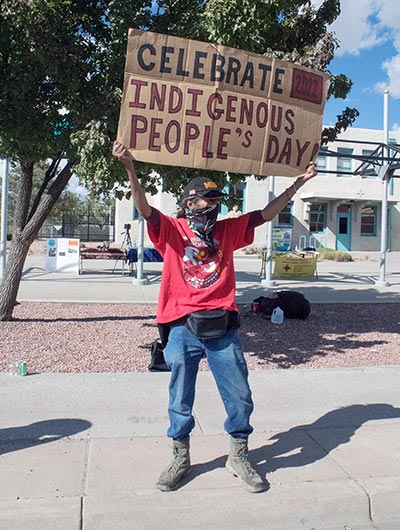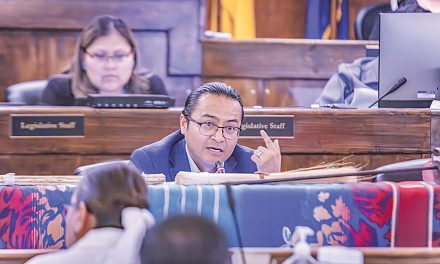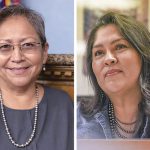
‘Set history correct’: Advocating for and celebrating Indigenous Peoples Day
NA’NÍZHOOZHÍ

Navajo Times | Hannah John
A man holds up a cardboard sign alongside the roadway on Indigenous Peoples Day in Gallup.
Mervyn Tilden, from Church Rock, said he wants National Indigenous Peoples Day to be celebrated in all 50 states.
Tilden said only 10 states officially celebrate the new holiday that replaced Columbus Day, and New Mexico replaced Columbus Day with Indigenous Peoples Day in 2019.
“The state of New Mexico and nine other states have this (Indigenous Peoples Day) recognized, as well,” Tilden said. “If it’s (the U.S.) ever going to be for us, Indigenous people, then all 50 states have to have the same resolution, proclamation, designated holiday.”
Recognizing Indigenous peoples
In total, 14 states – New Mexico, Oklahoma, South Dakota, Alabama, Alaska, Hawaii, Idaho, Michigan, Oregon, North Carolina, Vermont, Wisconsin, Minnesota, and Maine – and more than 130 U.S. cities that include the city of Phoenix, have replaced Columbus Day.
Arizona Gov. Doug Ducey signed a proclamation recognizing Oct. 10, as Indigenous Peoples Day. Still, it does not take the place of the Italian explorer, who is recognized as discovering the U.S. in 1492.
The national holiday to celebrate the first inhabitants of the U.S. was proposed in 1977 at a United Nations conference, according to the Native American Fatherhood and Families Association.
Thirteen years later, South Dakota became the first state to celebrate it in 1990, after it replaced Columbus Day in 1989, the association’s web page reads.
Tilden said he began celebrating Indigenous Peoples Day 19 years ago. He said his intention from the beginning has been to have every state replace Columbus Day.
“Columbus was lost when we found him,” he said. “He was somewhere in the Bahamas area, never came to North America; I don’t know why they’ve done this. That’s a tragedy of justice to honor a man who caused a genocide of millions of us Indigenous peoples.”
Along with his goal to have the holiday celebrated nationwide, he uses the events to celebrate the many Native ancestors who are not here, to work toward the federal government recognizing tribes as sovereign nations and educate people about Christopher Columbus’s history.
“(It is important) to set history correct,” Tilden said. “To make sure that the American people and their education system are not dumbed down.”
Correcting history
Zunneh-bah Jim, another attendee at the celebration on Monday, expressed similar sentiments on why Oct. 10, is essential and why education about the importance should be given.
“I think it’s important for not just Indigenous peoples to celebrate Indigenous Peoples Day, but everyone needs to support it,” she said. “Everywhere we are in this country, and all across Turtle Island, we’re on Indigenous land, stolen Indigenous land. I think it’s important for everyone to learn the history, the true history of what happened to our ancestors and how that still affects our people to this day.”
Because of Columbus’s atrocities against the Indigenous people over 500 years ago, Jim believes he does not need to be celebrated. She added she’s heard people label the tragic history of Native America as “the largest genocide in the world.”
“That’s why I really, highly encourage everyone to support Indigenous Peoples Day over former Columbus Day just because it’s so amazing that our Indigenous people are still here,” Jim said. “We’re surviving; we’re thriving. Everything that has been thrown at us, we’ve (overcome) it somehow.
“Even now with the pandemic, it really took a toll on our Indigenous people, and we still got through it.”
While she uses the day to celebrate the resiliency of Native people and her ancestors, she also uses it to mourn what has occurred within Native history.
“It’s not taught in U.S. history classes from K through 12,” she said. “It’s rarely taught in higher education, in our colleges and universities, so the more we can use this day to celebrate and revitalize all these Indigenous teachings, I think this is a good start. There’s so much more that needs to be done, but this is a good start.”
‘Incorrect and sugar-coated’
Jim expanded further on the lack of schools teaching Indigenous history; Jim believes what is being taught currently is “incorrect and sugar-coated.”
She said Thanksgiving is usually taught with the pilgrims and Indians coming together peacefully.
“They don’t talk about what happened, the murders, the massacres,” Jim said. “Everything that people don’t know about, the atrocities with the colonizers and oppressors. They did everything they could to wipe our Indigenous peoples almost to the point of extinction.”
She believes this history should be taught beginning at a young age and into higher education.
“You look at the U.S. textbooks, and we’re barely mentioned; maybe we’re given on page, but they still talk about us like we only existed in the past,” she said. “They don’t talk about us with what’s happening now, even with politics.”
Using Deb Haaland, the Interior secretary, as an example, Jim said there are currently Natives holding important political positions, which should be taught about in schools.
“We just got to see our people in these positions, and I think it inspires up-and-coming generations to also pursue that as well,” she said.
Jim thanks the older generations who began the movement to make Indigenous Peoples Day a holiday and advocated for Indigenous rights and for Indigenous history to be taught. She said these elders had to face a lot of racism and discrimination as they began their movements.
“As Indigenous peoples, there’s always challenge after challenge, and we have to keep fighting,” she said. “We do make up the minority of the U.S. population, so we do have to fight harder.
“Our voices are always ignored or swept under the rug. So, I think that’s where I’m really passionate about, just making sure we’re treated as human beings.”
President Joe Biden stated on Oct. 7, stating he “learned long ago that Tribal Nations do better when they make their own decisions.”
According to the statement, the Biden administration has more than 50 Native Americans, including Haaland, who work in the executive branch.








 Highway 264,
Highway 264, I-40, WB @ Winslow
I-40, WB @ Winslow